|
LOCAL
NATURE RESERVES

A
Nature
Reserve is defined in Section 15 of the National Parks and Access
to the Countryside Act 1949, as land managed for the purpose:
(a)
of providing, under suitable conditions and control, special opportunities
for the study of, and research into, matters relating to the flora and
fauna of Great Britain and the physical conditions in which they live,
and for the study of geological and physiographical features of special
interest in the area; or
(b)
of preserving flora, fauna, or geological or physiographical features of
special interest in the area; or for both these purposes.í |
EVENTS
10
August 2012
.jpg)
Rockpooling
Event at the Old Fort organised by the
Friends
of Shoreham Beach (FOSB)
Over
150 rockpoolers descended down on to the
safe beach at Old
Fort, Shoreham
Beach at low tide and they were able to forage
in the pools for over two hours. The critters of the seashore
never had a chance to escape the flimsy nets and probing fingers of the
youngsters. Fish fry swam in the shallow pools, notably scores of the young
of the Two-spotted Goby, Gobiusculus
flavescens. Many of the captures were decamped
to temporary aquariums further of the beach
and returned to the pools before the incoming tide.
FOSB
Events
BMLSS
Rockpooling
WILDLIFE
REPORTS
30
December 2012

Common
Dolphin, Delphinus delphis,
in Shoreham Harbour
Photograph
by Simone Mia Smith
BMLSS
Cetaceans
A Common
Dolphin
was spotted in the mouth of Shoreham
Harbour.
Report
by Phil Dunk on the Sussex
Ornithological Society News
25
October 2012
A
beautifully marked first winter male Desert
Wheatear delighted birders at Worthing
Splash Point (east of Worthing
Pier). Virtually tame, it was flitting
around the rocks and actively feeding - and not at all bothered by people
or cameras. The little beauty was confident enough to make eye contact
with his many fans.
The
Desert
Wheatear, Oenanthe
deserti, is a very rare visitor to
Britain. If an Eastern race bird does land here, it has been blown off
course quite a bit as it would have been on its way from its breeding grounds
in central Asia to its wintering grounds in Pakistan and north-east Africa.
Sussex
Ornithological Society First Report
9 October
2012
A
most unusual visit was made by half a dozen European
Spoonbills,
Platalea
leucorodia, to the River
Adur estuary about 2:00 pm,
at low tide, opposite the Airport.
Spoonbills
are
a Very
Scarce Passage Migrant in Sussex, occasionally recorded in ones or
twos, very rarely four or five, and six together is unprecedented.
SOS
Bird List (Spreadsheet)
7
October 2012
I
cycled the muddy western towpath of the River
Adur for
the first time this year and surprised a very large bird
of prey leaving a pasture at Botolphs.
I believe this to be my first ever brief (20 second) sighting of an Osprey.
It flew leisurely over the pasture, mobbed aggressively by a Crow
which look very small in comparison to the large raptor. The
Osprey
is classified as a scarce Passage Migrant by the Sussex
Ornithological Society.
Report
on SOS Sightings (Link)
| 20
September 2012

A
Bar-tailed
Godwit made a sudden landing in the shallow margins
of Widewater Lagoon.It
promptly started actively searching for food, wading in a few inches of
saline/brackish
water, poking its beak in the soft mud rapidly (about twenty times a minute?)
and repeatedly for a period of ten minutes or more without a break. Its
long beak was pink but half black nearest the tip.
SOS
Report
Adur
Coastal Reports |
 |
3
September 2012
When
the sun came out in the early afternoon,
the lower slopes of Mill Hill were alive
with butterflies.
Adonis
Blues
were
present in unprecedented numbers with the count of 205 in the transect
acre though to be under recorded because of
cloudy conditions at first. This count equates to an estimate of 800+ on
Mill Hill. At one point on my return journey, a spot just above the path
it was diffficult to avoid treading on the brown female Adonis
Blues amongst the Horseshoe
Vetch leaves.
Meadow
Brown
Butterflies
were
also common with over 150 in thetransect acre.
Nine
species of butterfly and three species of large
moth
were noted in the humid sunshine.
Full
Butterfly & Moth Report
30
- 31 August 2012
 |
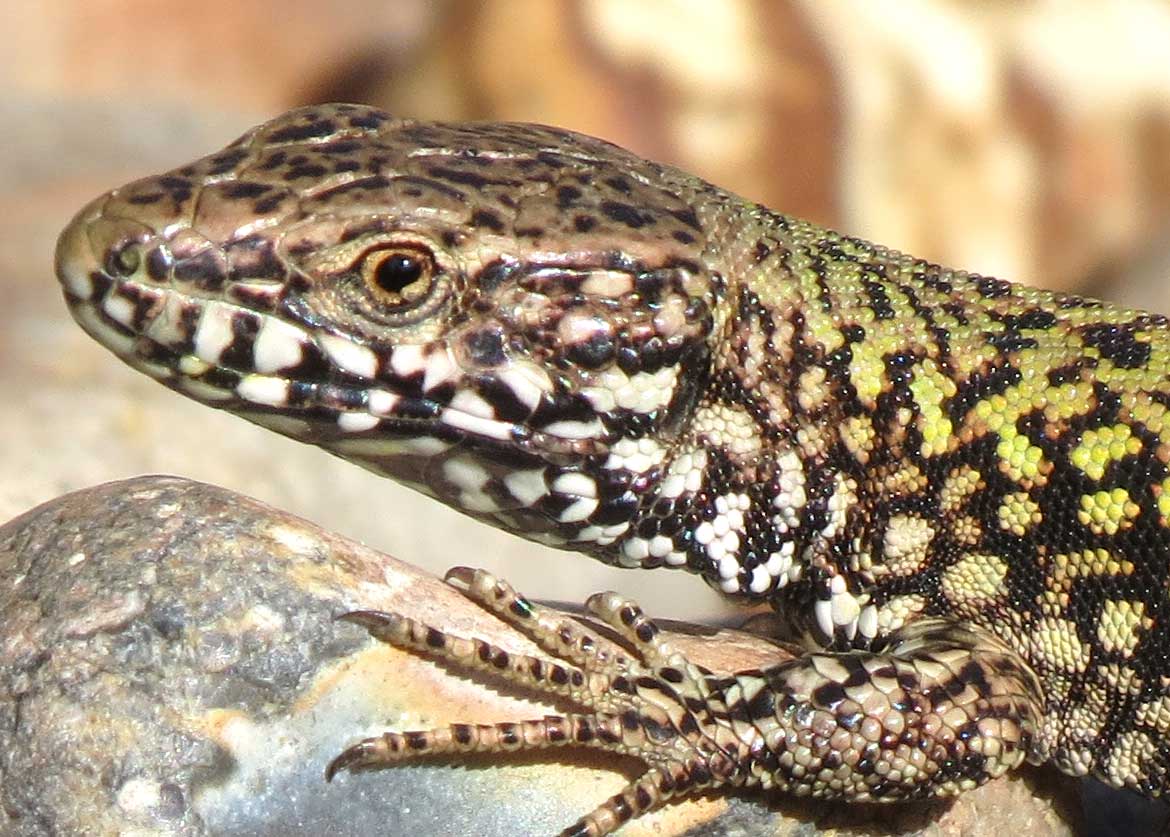
|
|
Common
Lizard
|
Wall
Lizard
|
I visited
Shoreham
Beach to try an get a photograph of a
Wall
Lizard after my success with a Common
Lizard the previous day. Nineteen Wall Lizards
were spotted on the south and west facing carnot flint walls of the Old
Fort, skittering
into holes in the wall at the earliest opportunity, with none of them keeping
still in the open and basking in the sun. A Common
Lizard was spotted basking on the
chestnut fencing at the top of the Pixie Path.
Adur
Lizards
23
August 2012
Mill
Hill was alive with butterflies
in same places with between fifty and a hundred seen all at once on the
best parts of the lower slopes. This was despite a large Cumulus
cloud casting a big shadow over the hill around
midday.
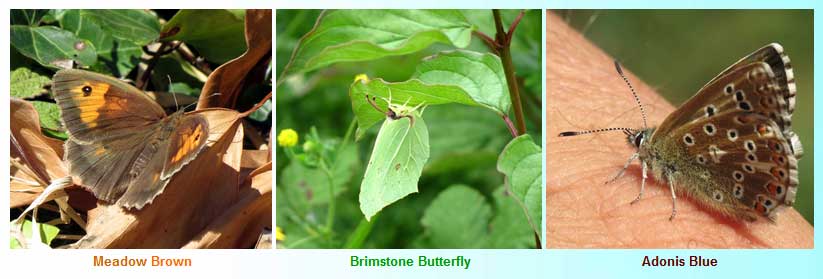
Meadow
Browns
were
in unprecedented numbers, estimated well in excess of a thousand and peaking
with at least 350 an acre (possibly 500+). Adonis
Blues
were recorded at 138 in the transect acre.
On the top meadows the Adonis Blue
density was probably exceeded by the hundreds of Common
Blues.
Twelve species of butterfly and four species of macro-moth were recorded
on and around Mill Hill in an hour. The tally
included 21 Chalkhill Blues
and four Wall Browns.
In a glade with Hemp Agrimony,
a half a dozen Red Admirals
visited.
Full
Butterfly Report (First Draft Record) & Species List
Mill
Hill Report
22
August 2012
On
the outskirts of Shoreham, a variety of brown butterflies
were in prominance of display. Speckled
Woods were frequent and with 30+ on a
detour passage through the Pixie Path. Eight
butterfly species were seen on a breezy
cloudy day. Five female Chalkhill
Blues were seen on Mill Hill Cutting SE.
Three separate sightings of the spectacular hoverfly
Volucella zonaria, were noted in and
around the Pixie Path, north of Old Shoreham.
Butterfly
Report |
054.jpg)
|
20
August 2012
A
Buzzard
flew over Southwick Hill and another sighting
was reported from nearby Thundersbarrow
(on the downs north of Shoreham).
17
August 2012
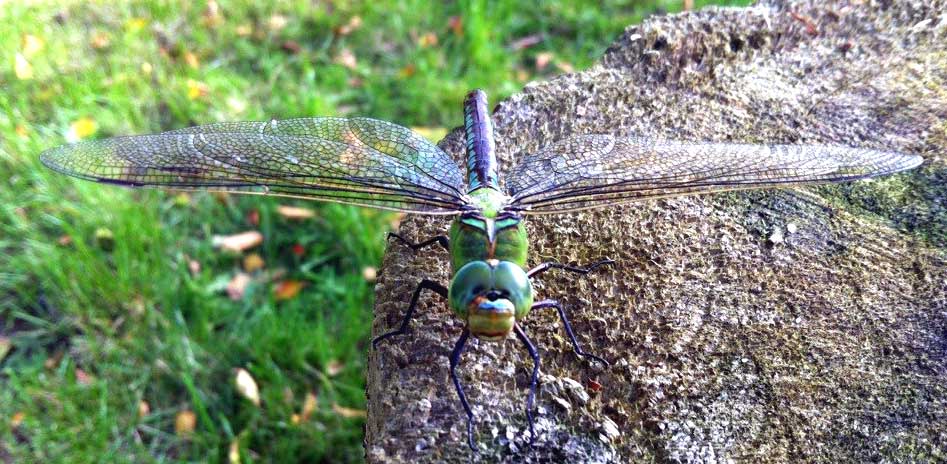
Female
Emperor Dragonfly
Photograph
by Sharon Penfold
This
spectacular dragonfly was spotted in a Sompting
garden. It is female Emperor Dragonfly,Anax
imperator.
Adur
Dragonfly Reports
On
a sunny and very humid day the butterflies
were out and seen almost as I left my front door. The first of seventeen
different species on the day was a Small
Tortoiseshell that was basking on the
busy Dolphin Road in Shoreham. It took flight as I cycled towards it. Ten
of the species were seen within the boundaries
of the built-up area.
 The
lower slopes of Mill Hill was alive with
hundreds of butterflies, at an average of a butterfly per square metre
over the southern part of the lower slopes, usually a less favourable area
for numbers. I spent under a quarter of an hour on the hill, but I still
managed to see over fifty of each of four species: Meadow
Browns,
Chalkhill
Blues,
Adonis Blues and
Common Blues.
(I
estimated their numbers to be over 100 of each in the transect acre.) The
lower slopes of Mill Hill was alive with
hundreds of butterflies, at an average of a butterfly per square metre
over the southern part of the lower slopes, usually a less favourable area
for numbers. I spent under a quarter of an hour on the hill, but I still
managed to see over fifty of each of four species: Meadow
Browns,
Chalkhill
Blues,
Adonis Blues and
Common Blues.
(I
estimated their numbers to be over 100 of each in the transect acre.)
Butterfly
Report
Mill
Hill Report
13
August 2012
Second
brood male Adonis Blue Butterflies
were seen immediately on a visit to the lower slopes of Mill
Hill curtailed by rain. Frequent
Meadow
Browns
were
the most prevalent of nine species of butterfly
seen in less than 20 minutes.
Full
Butterfly Report
5 August
2012
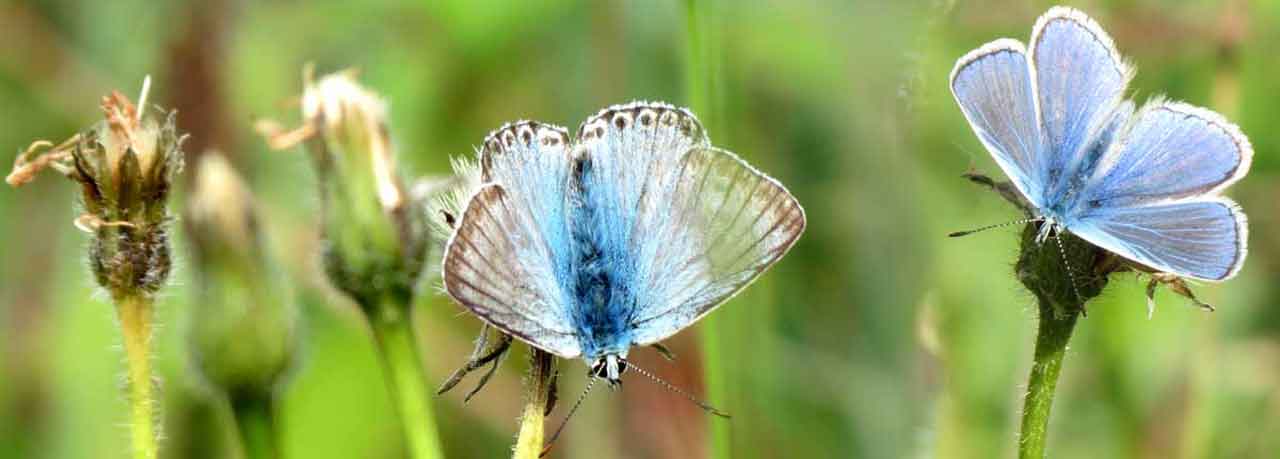
Because
of the dreadful weather I missed the peak
emergence of Chalkhill Blues
on Mill Hill this year. (The
Chalkhill
Blue Butterflies tend to emerge simultaneously
over two days at the turn of the month.)
On
the first suitable (if far from ideal) day
a trip to the lower slopes of Mill Hill discovered only 90 in the transect
acre on a cloudy cool (>18.0
°C) day.
There were 86 males
seen and four females
including two mating pairs. Thirteen butterfly
species (the most in a single day so far this year) and two macro moths
were seen on an unfavourable day.
Full
Butterfly and Moth Report
31
July 2012
At
the expected peak period for the Chalkhill
Blue Butterflies I
felt obliged to check out Mill Hill although
the conditions were far from ideal with overcast
skies and a very irritating breeze (Force
5) and cool (> 18.6
°C). On Mill
Hill the pattern of roosting butterflies
emerged with almost having to step on any butterflies to get them to show.
On the lower slopes one acre transect
I counted 64 Chalkhill Blues
which
comprised 62 active males
and one mating pair spotted in about 30 minutes. The actual numbers are
likely to be higher, at least double and possible many more. There were
a further 30 Chalkhill Blues
seen in other places including at least 24 on Mill
Hill Cutting.
Six
other species of butterfly were seen in unfavourable
conditions including a splendid fresh Wall
Brown on Mill Hill.
Full
Butterfly Report
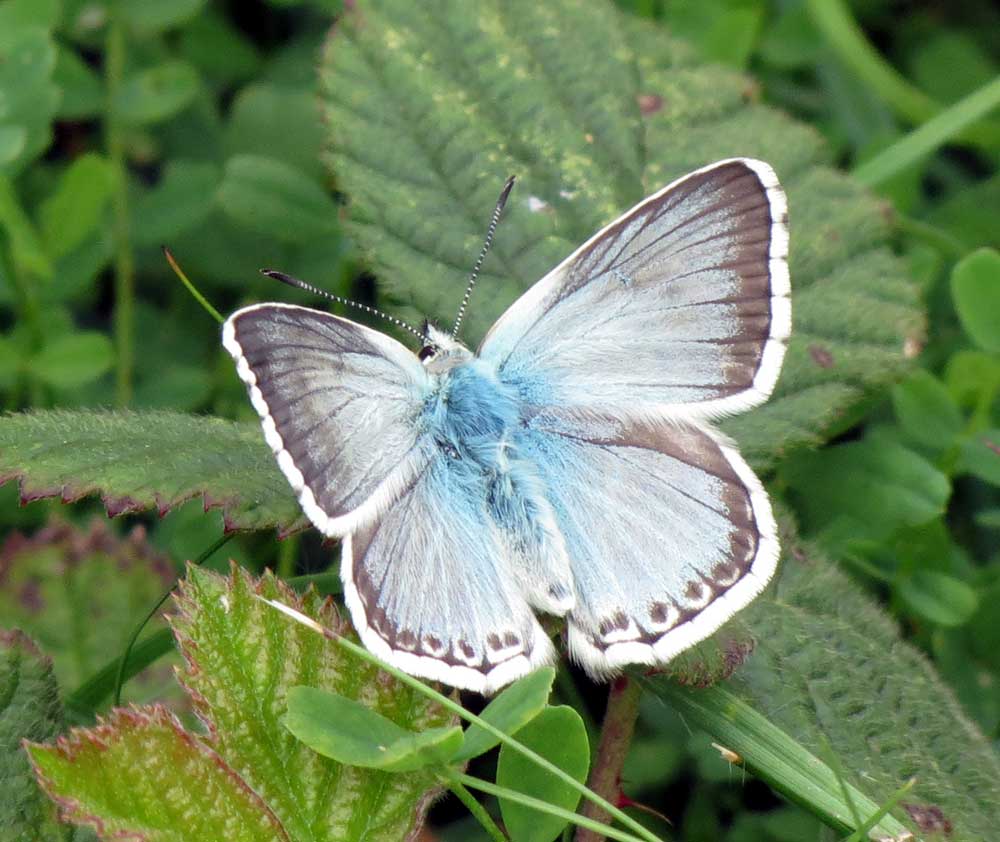 27
July 2012 27
July 2012
It
was cool and humid (18.2 °C,
compared to the last two warm days) and a
visit to Mill Hill saw fresh Chalkhill
Blues emerging.
In the the transect acre 91 of the pale blue males appeared in 20 minutes
on the verdant lower slopes. As it got warmer (20.1
°C) more appeared in flight estimated
at 150 in the acre and I spotted my first brown female of the year. The
vegetation was lusher and greener than normal and included frequent Round-headed
Rampion, the dark blue flowers
appearing above the low sward herbs. Ten butterfly
species and three macro-moths were noted.
Full
Butterfly & Moth Report
Mill
Hill Report
25
July 2012
Bats
were seen flying over my south Lancing back garden. They were probably
Pipistrelle
Bats.
22
July 2012
Fifty
male Chalkhill Blues
were seen as the sun came out just after midday,
45 on the acre transect
on the lower slopes of Mill Hill and another
five on the Mill Hill Cutting. The
species count was eight species of butterfly on
the first sunny day for about seven weeks.
Butterfly
& Moth Report
16
July 2012
I
visited
Mill Hill.
As soon as I dropped onto the lower slopes I saw my first Chalkhill
Blue of the year. This was followed by
another ten plus a magnificent Peacock,
Meadow
Browns,
Small
Heath, Gatekeepers,
Green-veined
and Large Whites.
Adur
Butterflies: First Dates
26
June 2012
Eventually
the breeze died down sufficiently so it was worth checking out the population
of Childing Pink, Petrorhagia
nanteuilii, on Silver
Sands on Shoreham
Beach.
Childing
Pink
There
were well a hundred single flowers showing
and I eventually discovered just a single double flower with scores of
the second flowers budding.
This population
of this scarce plant was thriving in numbers unprecedented this century.
14
June 2012
Just
a footprint away, I nearly trod on an Adder
on the lower slopes of Mill Hill, all coiled
up basking under the clouds, before it slithered into the undergrowth before
I could get my camera to focus. It was an adult grey snake with the distinctive
black diamond markings and a chunky good looking specimen.

|

|

|
|
Spotted
Orchid
|
Bee
Orchid
|
Southern
Marsh
Orchid
|
Four
species of orchid
were now in flower in Shoreham: Spotted
Orchids and the first budding
Pyramidal Orchids mostly on the southern
bank of the Slonk Hill Cutting, three of the
already fading Southern Marsh Orchids on
the southern bank of the Mill Hill Cutting, and the small but magnificent
Bee
Orchid on the verge on Mill Hill Road.
Life
Style of a Bee Orchid
9 June
2012
Adur
World Oceans Day 2012
Understanding
and celebrating our marine environment
.jpg)
The
twelfth Adur World Oceans Day 2012 took place
in the marquee on
Coronation
Green, by Shoreham
Footbridge at the High Street
end on the second Saturday
of the Adur Festival. Len
Nevell of the British
Marine Life Study Society presented the usual exhibition of
lobsters
and crabs.
The Friends of Shoreham Beach (FOSB)
took an active role with their display of the wonders of Shoreham
Beach. Wildlife writer Steve
Savage presented the whale
and dolphin exhibition with the life sized replica of a Bottle-nosed
Dolphin.
More
Photographs on Facebook
World
Oceans Day on Facebook
United
Nations: World Oceans Day
 |
4
June 2012
The
wind died down and the sun shined weakly making ideal conditions. for a
rockpooling
visit to Worthing Pier on a low (0.4
metres) spring tide, which produced a surprise
Common
Brittlestar, Ophiothrix
fragilis,as well as some infrequent
summer occurrences like two large Velvet
Swimming Crabs,
Necora
puber, a handful of small Common
Hermit Crabs, Pagurus bernhardus,
in winkle shells, a single Common Starfish
Asterias
rubens, one Dahlia
Anemone, Urticina felina, one
small Long-legged Spider Crab Macropodia
rostrata, and one sub-adult 5-Bearded
Rockling, Ciliata mustela. |
3 June
2012
A
steady Fresh Breeze (Force
5) was not conducive to the Shoreham
Beach Wild Flower Photography Walk, organised
by the Friends of Shoreham Beach
(FoSB).

Swathes
of Red Valerian
in flower dominated the shingle on east
Shoreham Beach with the contrasting leaves of Silver
Ragwort which was beginning to bud, and
the patches of Sea
Kale
which were showing their first flowers.Starry
Clover, Trifolium stellatum,
was flowering on the grass and herb banks of the Old
Fort and on the shingle. The woody stems
of Tree Mallow
were impressive swaying wildly in the breeze. Two Wall
Lizards,
Podarcis
muralis, skittered
by the Old Fort,
one over the shingle making for the safety of the wall and another large
greenish one in the long grass near the west facing flint carnot
wall.
Full
Report
28
May 2012
A
special shrimping
trip to Lancing Beach (by Widewater)
(with Selena Barr and Philippa Lane from Field
magazine, and Peter Talbot-Elsden)
in ideal weather conditions (1.5 metre
neap low tide) caught three pints of Brown
Shrimps, Crangon crangon,
between
us. There was not much else in the nets: frequent flatfish
fry, two small Lesser
Weever,
Echiichthys
vipera, one swimming
crab Portumnus latipes with
"fleur-de lis"
markings, one Vernal Crab, Liocarcinus
vernalis, one badly damaged (but still
alive, it nipped me) Masked Crab, Corystes
cassivelaunus, a few large green Shore
Crabs, Carcinus maenas, and
a small Plaice,
Pleuronectes
platessa, (or possibly a Flounder?).

BMLSS
Shrimping Page
Field
Magazine Inclusion
13
May 2012
An
Osprey
was spotted flying over Shoreham Airport and the identification was confirmed
by a photograph.
2
May 2012
A
male Hen Harrier,
Circus
cyaneus, made an impressive display when it visited the open space
over New Monks Farm, Lancing.
.jpg)
Hen Harrier
(Click
on the image to view the video)
"It
stayed for about an hour, constantly diving down, presumably after mice
or other small animals. It attracted quite a large flock of gulls
and crows that
were trying to mob it, although it didnít seem too concerned."
The
display was captured on a video
film. This bird of prey is a scarce
(winter visitor and passage migrant) visitor to Sussex.
16
April 2012
On
a Cumulus
day too cool for butterflies,
a visit to Mill
Hill was only entertained because the
forecast for later in the week was worse. On
the lower slopes the
first flowers of Horseshoe
Vetch,
Hippocrepis comosa,
appeared with another prostrate downland herb Milkwort.
The tiny black pollen beetles
Meligethes scrambled over the flowers on
the bank, especially on Horseshoe Vetch, Dandelions
and on a few of the
violets.
Dog
Violets predominated with thousands still
scattered over the slopes. Occasionally, a skipper
(butterfly) rose from the ground and fluttered rapidly to a new resting
place. The only one positively identified was a fresh Grizzled
Skipper.
Adur
Violets
Adur
Butterfly List 2012
30
March 2012
My
first Hedgehog
of the year scrambled in the road gutter at the junction of St Julian's
Lane, Kingston Buci, near Church Green, Shoreham,
and much too near the main traffic for its own safety. It was seen twenty
minutes before midnight.
 28
March 2012 28
March 2012
Seven
species of butterfly
were seen on the outskirts of Shoreham in the early afternoon including
my first of the year male Orange-tip
and a Green-veined White.
These
two are new Adur Nature Notes records for March.
My first Small Tortoiseshell
of the year was present as well as a Peacock,
a Comma
and a Small White.
Adur
Butterfly List 2012
Adur
Butterfly Flight Times
Adur
Butterflies: First Dates
Adur
Violets
27
March 2012
I
recorded ten different butterfly species
in a day, which I cannot recall ever doing before during the month of March.
In just a couple of hours at Mill
Hill (Shoreham) I counted four Grizzled
Skipper (first of the year), one Orange
Tip (first of the year), one Speckled
Wood, one Holly
Blue ((first of the year), one Brimstone,
one Small White,
14 Peacock,
one Red Admiral,
two Small Tortoiseshell
and two Comma.
The day-flying moths Pyrausta pupuralis
and
Pyrausta
despicata were both present
in good numbers, along with the odd Pyrausta
nigrata.
I
was surprised to find a freshly emerged Grizzled
Skipper on Mill
Hill. There were also half a dozen Peacocks
and a Small Tortoiseshell.
Reptiles were also out enjoying the sunshine, one black Adder,
two Common Lizards
and a Slow Worm.
12
March 2012
Under
a blue sky and weak sunshine (14.6
°C) the Sweet
Violets were flowering
on Mill Hill, where I saw two Peacock
Butterflies (my first two butterflies
of the year), one flying across the road at the top of the hill and another
one fluttering over the lower slopes.
Adur
Butterfly List
Report
on the Adur
Butterfly Blog
Adur
Wild Flower Blog
29
February 2012
Around
midday
the sun shone weakly under a blue sky, but the warmth was enough for the
first reptiles of the year to come out. On the south and west facing carnot
wall of the Old
Fort (on Shoreham Beach) I noted at least
16* separate
Wall Lizards, Podarcis
muralis, energetically skittered
over the flint cobbled wall and into holes and crannies. All but one had
intact tails and virtually all of them were large adults, but only the
largest had a distinctive greenish tinge. (*
duplicates excluded)
Adur
Lizards

|

|
|
Widewater
Lagoon
|
Wall
Lizard
|
On
Widewater Lagoon a
paddling* of ten Teals
were seen swimming on the still lagoon, and distinctively upturning themselves
to feed. One of the three Little Egrets
was feeding in the shallows: it was seen swallowing half a dozen 3-spined
Sticklebacks in four minutes, with only
two failed attempts. On the verges of the
Waterworks
Road in Old Shoreham, I noted a small clump
of the first flowering
Sweet Violets of the year. (*Collective
noun ? paddling in a V formation of three at times.)
22
& 26 - 29 February 2012
A
keen-eyed birdwatcher caught a tantalising glimpse of a Yellow-browed
Warbler, Phylloscopus
inornatus, skulking in the bottom
of the bushes in a build-up area to the west of the hospital in Worthing.
This
Asiatic bird is a rare visitor to Britain where it is occasionally to be
found in bushy coastal locations.
Image
1
Image
2
Image
3
23
February 2012
On
the still waters of Widewater Lagoon, a raft
of exactly a dozen Tufted Ducks
rested, only swimming more to the centre of the eastern end of the lagoon
when approached.

|

|
|
Snow
Bunting
|
Tufted
Ducks
|
The
two visiting Snow Buntings
were not so reticent feeding on the flat beach
shingle
in the same area as before just above the sea high tide
mark at the western end of Widewater.
Adur
Nature Notes: Snow Buntings
10
January 2012
The
two Snow Buntings, Plectrophenax
nivalis,
were well camouflaged amongst the pebbles, feeding on seed provided for
them and attracting a handful of birdwatchers
with telephoto lens. Because they look like Sparrows
with the naked eye, they would have been hard to discover if they did not
stay on the same stretch of beach south of the western end of Widewater,
despite disturbance by dog walkers. The two small birds flew off after
the arrival of a Feral Pigeon. |
 |
6 January
2012
An
Iceland
Gull was spotted on Shoreham
Beach, on the seaward side of the west arm of the harbour
from late morning to 1.15 pm.
The
Iceland
Gull is a very
scarce winter visitor and passage migrant to the Shoreham area.
This
Iceland
Gull was seen by other birdwatchers on several
occasions from 4 January 2012.
Earlier it was photographed
over the River Adur.
Native
Sussex (Mick Davis) Birding Blog
3 January
2012
It
was a horrible morning with sheet rain and gales from the south-west, reaching
a steady Gale Force 8
from 10:00 am to midday and after,
and gusting to Storm Force 10 (max 61 mph)
from 11:00 am.
Beaufort
Scale
Shoreham
Weather 2012
Met
Office: Shoreham
2 January
2012
On
east Lancing Beach
(by Widewater),
I finally managed to get a look at the small Snow
Buntings camouflaged amongst the pebbles,
the sparrow-sized fawn and cream birds crouching down and one of the two
hiding behind a cobble-sized stone only slightly smaller than it.
Reports
on Sussex
Ornithological Society News
Adur
Nature Notes 2011
|


